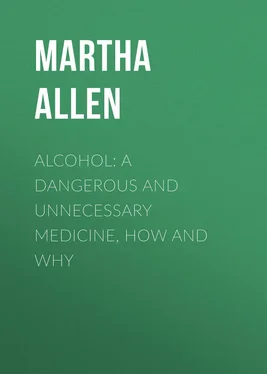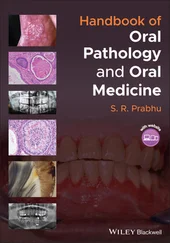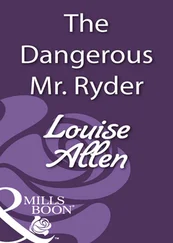Martha Allen - Alcohol - A Dangerous and Unnecessary Medicine, How and Why
Здесь есть возможность читать онлайн «Martha Allen - Alcohol - A Dangerous and Unnecessary Medicine, How and Why» — ознакомительный отрывок электронной книги совершенно бесплатно, а после прочтения отрывка купить полную версию. В некоторых случаях можно слушать аудио, скачать через торрент в формате fb2 и присутствует краткое содержание. Жанр: foreign_antique, foreign_prose, на английском языке. Описание произведения, (предисловие) а так же отзывы посетителей доступны на портале библиотеки ЛибКат.
- Название:Alcohol: A Dangerous and Unnecessary Medicine, How and Why
- Автор:
- Жанр:
- Год:неизвестен
- ISBN:нет данных
- Рейтинг книги:3 / 5. Голосов: 1
-
Избранное:Добавить в избранное
- Отзывы:
-
Ваша оценка:
- 60
- 1
- 2
- 3
- 4
- 5
Alcohol: A Dangerous and Unnecessary Medicine, How and Why: краткое содержание, описание и аннотация
Предлагаем к чтению аннотацию, описание, краткое содержание или предисловие (зависит от того, что написал сам автор книги «Alcohol: A Dangerous and Unnecessary Medicine, How and Why»). Если вы не нашли необходимую информацию о книге — напишите в комментариях, мы постараемся отыскать её.
Alcohol: A Dangerous and Unnecessary Medicine, How and Why — читать онлайн ознакомительный отрывок
Ниже представлен текст книги, разбитый по страницам. Система сохранения места последней прочитанной страницы, позволяет с удобством читать онлайн бесплатно книгу «Alcohol: A Dangerous and Unnecessary Medicine, How and Why», без необходимости каждый раз заново искать на чём Вы остановились. Поставьте закладку, и сможете в любой момент перейти на страницу, на которой закончили чтение.
Интервал:
Закладка:
Foods induce healthy, normal action of all the bodily functions.
The chapter upon “Diseases Produced by Alcohol” is evidence that by this test alcohol shows up in its true nature as a poison, and not a food. Alcohol destroys healthy normal action of all the bodily functions, and builds up impure fat, fatty degeneration, instead of strong, firm muscle. Dr. Parkes, one of the most famous of English students of alcohol, says: —
“These alcoholic degenerations are certainly not confined to the notoriously intemperate. I have seen them in women accustomed to take wine in quantities not excessive, and who would have been shocked at the imputation that they were taking too much, although the result proved that for them it was excess.”
Dr. Ezra M. Hunt, late secretary of New Jersey State Board of Health, remarks: —
“The question of excess occurs in sickness as well as in health, and all the more because its determination is so difficult and the evil effects so indisputable. The dividing line in medicine, even between use and abuse, is so zigzag and invisible that common mortals, in groping for it, generally stumble beyond it, and the delicate perception of medical art too often fails in the recognition.”
All non-alcoholic writers assert that the continuous use of alcohol as a medicine is equally injurious to all the bodily functions as the employment of it as a beverage. Calling it medicine does not change its deadly nature, nor does the medical attendant possess any magical power by which a destructive poison may be converted into a restorative agent.
Dr. Noble, writing recently to the London Times , said: —
“The internal use of alcohol in disease is as injurious as in health.”
Since foods induce healthy, normal action of all the bodily functions, and alcohol injures every organ of the body in direct proportion to the amount consumed, by this test it is proved to not be a food.
Foods give strength. Alcohol weakens the body. This has been determined again and again by experiments upon gangs of workmen and regiments of soldiers. These experiments always resulted in showing that upon the days when the men were supplied with liquor they could neither use their muscles so powerfully, nor for so long a time, as on the days when they received no alcoholic drink. Of the results of such tests Sir Andrew Clark, late Physician to Queen Victoria, said: —
“It is capable of proof beyond all possibility of question that alcohol not only does not help work but is a serious hinderer of work.”
So satisfied are generals in the British army of the weakening effect of alcohol that its use is now forbidden to soldiers when any considerable call is to be made upon their strength. The latest example of this was in the recent Soudan campaign under Sir Herbert Kitchener. An order was issued by the War Department that not a drop of intoxicating liquor was to be allowed in camp save for hospital use. The army made phenomenal forced marches through the desert, under a burning sun and in a climate famous for its power to kill the unacclimated. It is said that never before was there a British campaign occasioning so little sickness and showing so much endurance. Some Greek merchants ran a large consignment of liquors through by the Berber-Suakim route, but Sir Herbert had them emptied upon the sand of the desert. A reporter telegraphed to England: —
“The men are in magnificent condition and in great spirits. They are as hard as nails, and in a recent desert march of fifteen miles, with manœuvring instead of halts, the whole lasting for five continuous hours, not a single man fell out!”
This was in decided contrast to the march in the African war some years before when, as they passed through a malarial district, and a dram was served, men fell out by dozens. Dr. Parkes, one of the medical officers, prevailed upon the commander-in-chief to not allow any more alcoholic drams while the troops were marching to Kumassi.
Experiments in lifting weights have also been tried upon men by careful investigators. In every case it was found that even beer, and very dilute solutions of alcohol, would diminish the height to which the lifted weight could be raised. As an illustration of the deceptive power of alcohol upon people under its influence, it is said that persons experimented upon were under the impression, after the drink, that they could do more work, and do it more easily, although the testing-machine showed exactly the contrary to be true.
Athletes and their trainers have learned by experience that alcohol does not give strength, but is, in reality, a destroyer of muscular power. No careful trainer will allow a candidate for athletic honors to drink even beer, not to speak of stronger liquors. When Sullivan, the once famous pugilist, was defeated by Corbett, he said in lamenting his lost championship, “It was the booze did it”; meaning that he had violated training rules, and used liquor. University teams and crews have proved substantially that drinking men are absolutely no good in sports, or upon the water. Football and baseball teams, anxious to excel, are beginning to have a cast-iron temperance pledge for their members. So practical experience of those competing in tests of strength and endurance teach eloquently that alcohol does not give strength, but rather weakens the body, by rendering the muscles flabby.
Sandow, the modern Samson, wrote his methods of training in one of the magazines a few years ago, and stated that he used no alcoholic beverages. The ancient Samson was not allowed to taste even wine from birth.
A question worthy of serious consideration is: how are the sick to be strengthened and “supported” by drinks which athletes are warned to specially shun as weakening to the body? Either the sick are mistakenly advised, or the athletes are in error. Which seems the more likely?
Dr. Richardson says in Lectures on Alcohol : —
“I would earnestly impress that the systematic administration of alcohol for the purpose of giving and sustaining strength is an entire delusion.”
In another place he says: —
“Never let this be forgotten in thinking of strong drink: that the drink is strong only to destroy; that it never by any possibility adds strength to those who drink it.”
Sir William Gull, late physician to the Prince of Wales, said before a Select Committee of the House of Lords on Intemperance: —
“There is a great feeling in society that strong wine and other strong drinks give strength. A large number of people have fallen into that error, and fall into it every day.”
Any unprejudiced person can readily see that experience and experiment unite in testifying that alcohol does not give strength, hence differs radically from most substances commonly classed as foods. Yet millions of dollars are spent annually by deluded people upon supposedly strength-giving drinks, and thousands of the sick are ignorantly, or carelessly, advised to take beer or wine to make them strong and to support them when solid food cannot be assimilated. Truly, “My people is destroyed for lack of knowledge.”
Foods give force to the body.
Dr. Richardson says: —
“We learn in respect to alcohol that the temporary excitement is produced at the expense of the animal matter and animal force, and that the ideas of the necessity of resorting to it as a food, to build up the body or to lift up the forces of the body, are ideas as solemnly false as they are widely disseminated.”
Dr. Benjamin Brodie says in Physiological Inquiries : —
“Stimulants do not create nerve power: they merely enable you, as it were, to use up that which is left.”
Dr. E. Smith: —
“There is no evidence that it increases nervous influence, while there is much evidence that it lessens nervous power.”
Читать дальшеИнтервал:
Закладка:
Похожие книги на «Alcohol: A Dangerous and Unnecessary Medicine, How and Why»
Представляем Вашему вниманию похожие книги на «Alcohol: A Dangerous and Unnecessary Medicine, How and Why» списком для выбора. Мы отобрали схожую по названию и смыслу литературу в надежде предоставить читателям больше вариантов отыскать новые, интересные, ещё непрочитанные произведения.
Обсуждение, отзывы о книге «Alcohol: A Dangerous and Unnecessary Medicine, How and Why» и просто собственные мнения читателей. Оставьте ваши комментарии, напишите, что Вы думаете о произведении, его смысле или главных героях. Укажите что конкретно понравилось, а что нет, и почему Вы так считаете.












